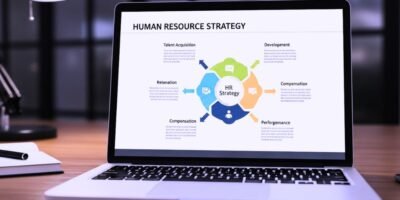Organizations recognize their people as the most valuable assets in today’s knowledge-based economy. Human Capital Management is a strategic approach that leverages individuals’ skills, knowledge, and talents to drive organizational success. This article explores the concept of Human Capital Management’s key components, benefits, challenges, and impact on organizational performance.
Understanding Human Capital Management
Human Capital Management strategically manages an organization’s workforce to optimize employee performance, engagement, and development. It involves aligning HR practices and strategies with business goals and objectives. It recognizes that employees are not just resources but valuable capital that can be leveraged to gain a competitive advantage.
Key Components of Human Capital Management
Human Capital Management begins with attracting and recruiting top talent that aligns with the organization’s culture and values. It involves developing effective recruitment strategies, sourcing candidates through various channels, and implementing rigorous selection processes to ensure the right fit.
Performance Management
Effective performance management systems are essential in Human Capital Management. Clear performance expectations, regular feedback, goal-setting, and performance evaluations help employees understand their roles, enhance their performance, and contribute to organizational objectives.
Learning and Development
Human Capital Management emphasizes continuous learning and development to enhance employee skills, knowledge, and capabilities. It involves providing training opportunities, mentoring programs, career development plans, and fostering a learning culture within the organization.
Succession Planning
This includes identifying and developing future leaders within the organization. Succession planning ensures a smooth transition of critical roles and minimizes disruptions. It involves identifying high-potential employees, providing growth opportunities, and preparing them for leadership positions.
Employee Engagement and Retention
Engaged and satisfied employees are likelier to contribute their best efforts to the organization. It focuses on creating a positive work environment, fostering employee engagement, and implementing initiatives to retain top talent.
Benefits of Human Capital Management
Effective Human Capital Management practices contribute to improved organizational performance. By aligning individual goals with corporate objectives, organizations can harness the full potential of their employees, leading to increased productivity, innovation, and profitability.
Talent Development and Retention
Human Capital Management emphasizes employee development, which enhances skills, knowledge, and capabilities. It leads to higher employee satisfaction, increased retention rates, and reduced turnover costs.
Competitive Advantage
Organizations that effectively manage their human capital gain a competitive edge. By attracting and retaining top talent, organizations can develop unique capabilities, drive innovation, and respond effectively to market changes.
Enhanced Employee Engagement
It creates a work environment where employees feel valued, engaged, and motivated. Engaged employees are more committed, productive, and willing to go the extra mile to achieve organizational goals.
Improved Decision-Making
Human Capital Management provides valuable data and insights into the organization’s workforce, skills, and capabilities. This information enables data-driven decision-making, enabling organizations to allocate resources effectively, identify skill gaps, and make informed talent management decisions.
Challenges in Human Capital Management
Implementing effective Human Capital Management can present challenges:
Aligning HR with Business Strategy
Human Capital Management requires HR to be aligned with the overall business strategy. HR professionals must understand the organization’s goals and objectives and develop HR practices supporting them.
Technology Integration
Leveraging technology solutions for HR processes, such as talent management systems, can be complex. Organizations must invest in appropriate technologies, train employees on their usage, and ensure seamless integration with existing systems.
Changing Workforce Dynamics
Organizations need to adapt to the changing dynamics of the workforce, including generational differences, remote work, and the gig economy. It requires flexibility and agility to address these evolving trends.
Measuring the Impact of HCM
Measuring the direct impact of Human Capital Management initiatives on organizational performance can be challenging. Establishing meaningful metrics and tracking progress is essential to demonstrate the value of its investments.
Impact of Human Capital Management
Human Capital Management has a profound impact on organizational success:
Organizational Agility
Effective Human Capital Management enables organizations to adapt quickly to market changes by aligning their workforce with evolving business needs. This agility allows organizations to respond to challenges and seize opportunities effectively.
Innovation and Creativity
By fostering a continuous learning and development culture, it encourages employee innovation and creativity. Organizations that value and nurture their human capital are more likely to foster a culture of innovation.
Employer Branding and Reputation
Organizations prioritize developing a positive employer brand and reputation. It attracts top talent, enhances the organization’s image, and creates a competitive advantage in the talent market.
Employee Well-being and Satisfaction
It creates a work environment that values well-being and satisfaction. It leads to higher employee morale, increased job satisfaction, and a positive organizational culture.
Long-term Success
Effectively contributes to organizations’ long-term success and sustainability. Organizations build a loyal, skilled workforce that can drive growth and navigate challenges by investing in their employees.
Conclusion
Human Capital Management recognizes employees as valuable assets and focuses on leveraging their skills, knowledge, and talents to achieve organizational success. Organizations can unlock the full potential of their human capital by implementing strategic practices in talent acquisition, performance management, learning and development, succession planning, and employee engagement. Despite challenges such as aligning HR with business strategy and adapting to changing workforce dynamics, organizations that prioritize are better positioned to attract top talent, drive innovation, and achieve long-term success.













